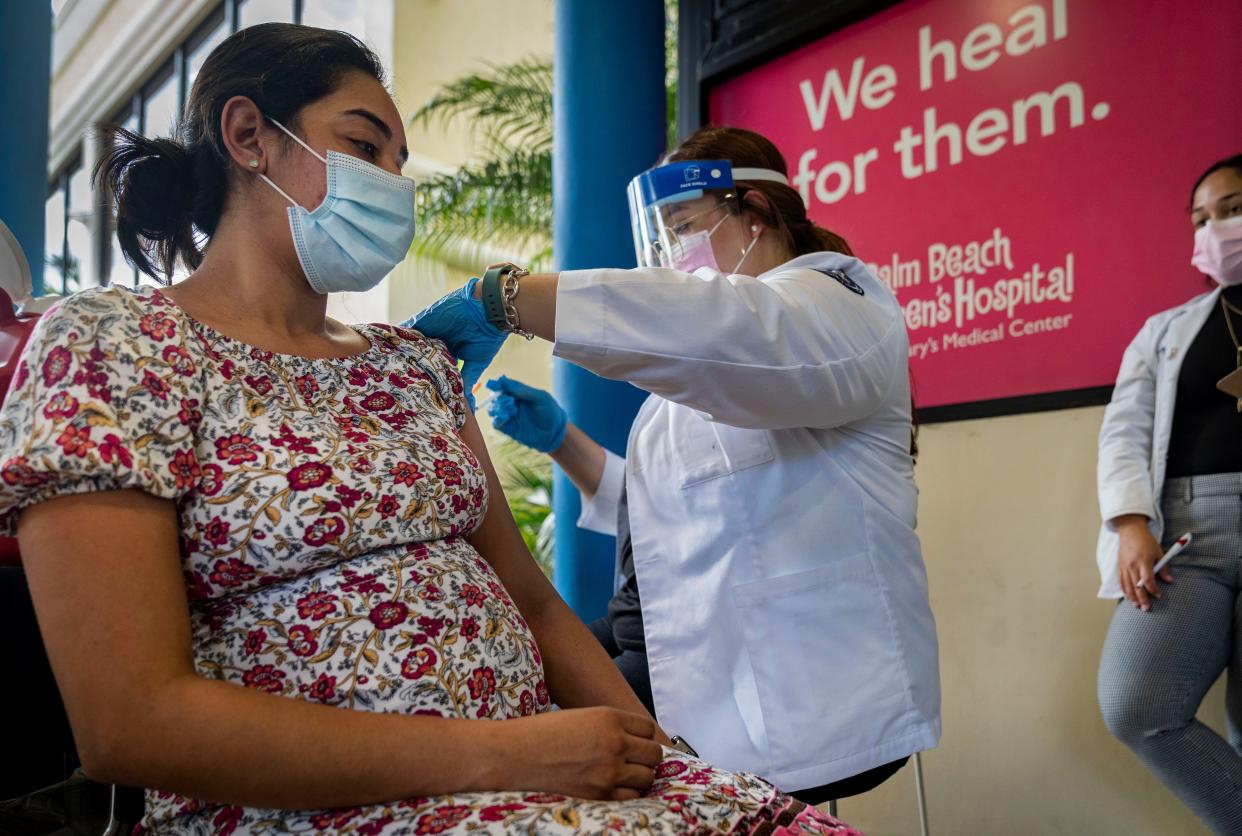Prevention: It's safe and protective to get COVID vaccination while pregnant

- Oops!Something went wrong.Please try again later.
To provide our community with important public health information, The Register-Guard is making this content free to read. To support important local journalism like this, please consider becoming a digital subscriber.
Are you pregnant? Congratulations!
Along with the usual concerns a pregnant person has, you also are coping with being pregnant during a pandemic. As an OB-GYN, I understand your concerns and I can reassure you on several fronts.
First, you can be safe during pregnancy, despite the threat of contracting COVID-19. Second, your baby can be safe, too. The way to reduce worries during pregnancy is to take the recommended precautions, such as wearing a mask in public and getting vaccinated against COVID. If you haven't been vaccinated against the virus yet, it’s safe to do so during pregnancy.
For local stories that matter, subscribe today.
Studies have shown that mothers pass protective antibodies from the vaccine to the baby through the placenta and breast milk. Antibodies can help to protect the child from the virus during pregnancy and in their first months of life. In addition, data has shown that it is safe to receive any of the three vaccines approved in the U.S. during while pregnant. Vaccination is recommended by many medical organizations, including the Centers for Disease Control and the American College of Obstetrics and Gynecology, for those who are trying to conceive, are pregnant or are breastfeeding.
Unfortunately, about two-thirds of those who are pregnant are not vaccinated. If that includes you, be aware that your newborn may have a higher incidence of health issues if you get COVID while pregnant. And you may be ill at a time when you want to be as healthy as possible. Data show that at least 141,500 cases of COVID-19 have occurred in U.S. pregnancies. Ninety-seven percent of pregnant COVID patients were unvaccinated. Of those who tested positive, 24,388 were hospitalized and at least 218 have died of complications from the coronavirus.
New data show that unvaccinated pregnant patients who contract COVID-19 are five times more likely to land in the ICU, 14 times more likely to need intubation and have 15 times higher rates of mortality. Those with COVID-19 in pregnancy have an increased risk of parental high blood pressure, blood clots, gestational diabetes, low white blood cell count and bleeding during birth. The risk of stillbirth is also increased.
Going quick: Lane County Public Health's upcoming COVID booster appointments fill up in hours
I have seen patients come in with COVID symptoms that worsen over time into respiratory distress and failure, and they had to go into the intensive care unit. These are our sickest pregnant patients, and the biggest risk to the baby is the severity of the parent’s illness. Sometimes, we have to recommend that pregnant COVID patients deliver their babies pre-term. For all of these reasons, I join the CDC in urging everyone to get vaccinated against COVID.
You may have heard a few falsehoods about COVID vaccinations. They will not affect your fertility. Whatever reports you may have read about that outcome are untrue; researchers haven’t found any data to support that myth. Also, a vaccine will not increase the odds of miscarrying, which is about 11 percent to 16 percent in all pregnancies and 13 percent in those who are vaccinated against COVID-19.
The technology behind the vaccines is not new; work began in the 1970s, increased when the therapeutic possibilities of mRNA were recognized, and was ready to be applied when the pandemic struck. Finally, booster shots are not a sign the vaccine has failed; in fact, waning effectiveness is common with some vaccines, such as tetanus or flu shots, which must be renewed regularly.
It is common for health care providers to recommend other vaccines while you are pregnant, including influenza and whooping cough. Now it is best practice to recommend the COVID-19 vaccine during pregnancy.
The data from studies of thousands of vaccinated pregnant patients is clear: The vaccines are safe and have no red flags for increased adverse reactions for parent or child.
Talk to your healthcare provider to get your questions answered and review the data about the safety of the vaccines versus the very real risks of staying unvaccinated.
In this season of gratitude, I am thankful for the vaccines that are helping us combat COVID-19.
Dr. Emily West is an obstetrician gynecologist for Kaiser Permanente Northwest. For more information on Kaiser Permanente’s Lane County medical office, visit kp.org/lane.
This article originally appeared on Register-Guard: Prevention: It's safe, protective to get COVID vaccination while pregnant

